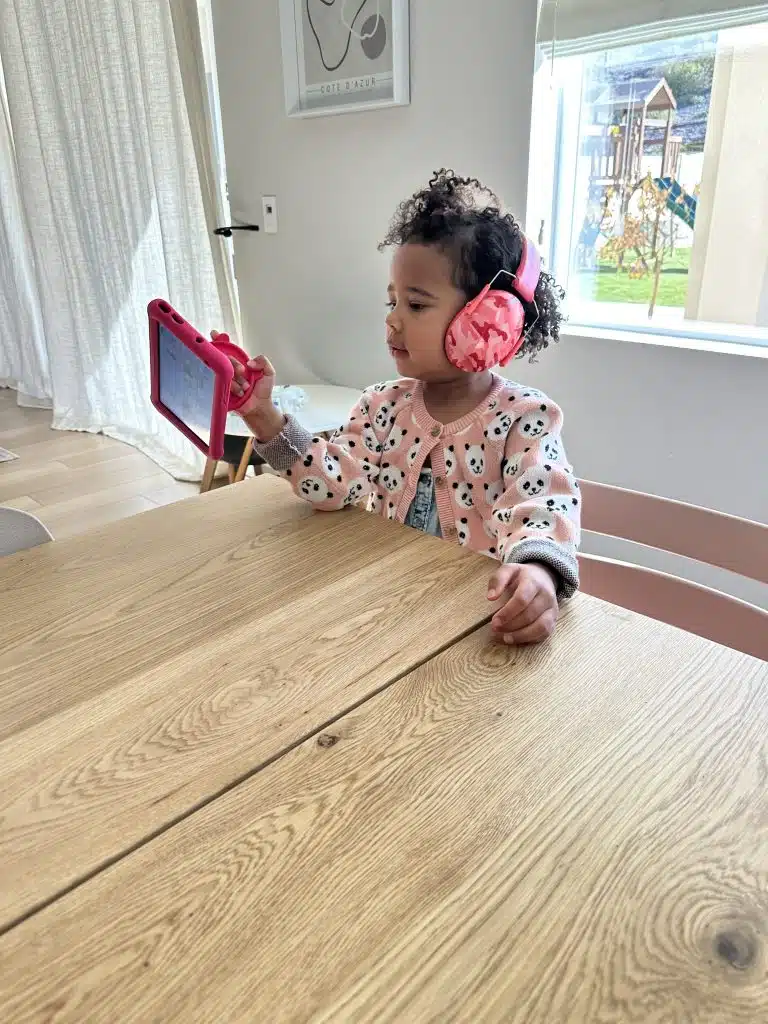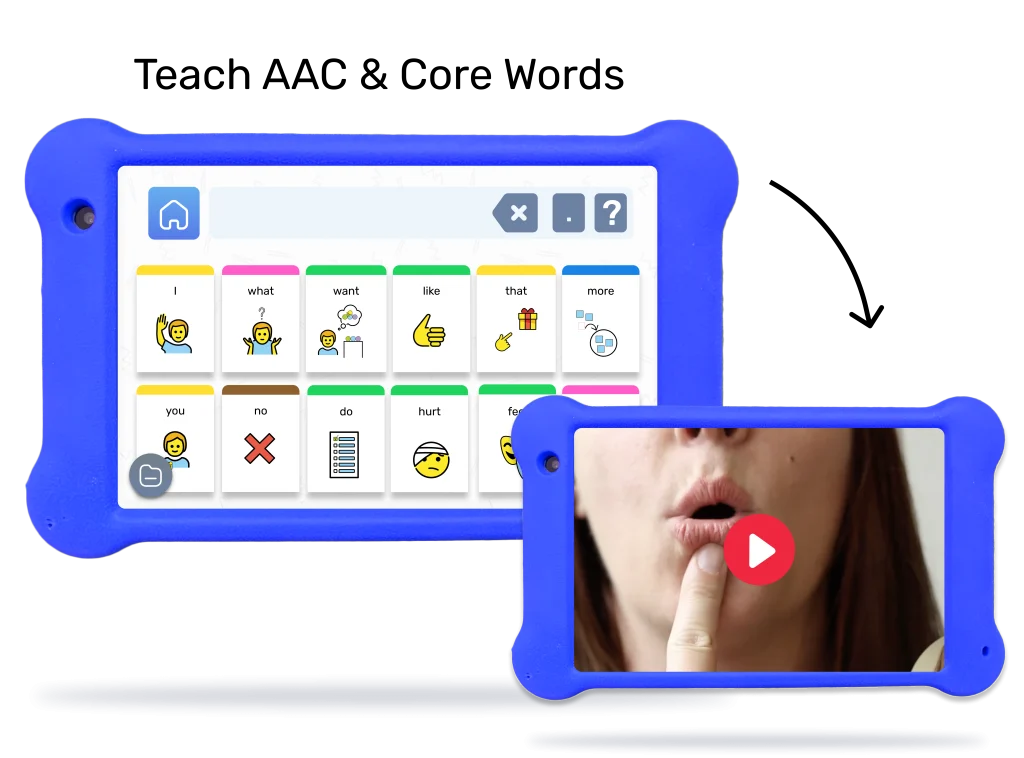Imagine the joy and hope you would feel if your child, who hasn’t spoken for years, suddenly says their first word. Is this possible? Can kids with nonverbal autism learn to speak? The answer is yes! Every child’s path will be unique, but there are ways to help neurodivergent kids unlock the power of communication.
Table of Contents
Diving into Nonverbal Autism
To help your child find their voice, it’s important to understand what nonverbal autism means. Autism Spectrum Disorder (ASD) affects how someone communicates and interacts with others. Some kids on the spectrum have trouble speaking or don’t speak at all – these kids are considered nonverbal autistic individuals.
- About 25-30% of children with ASD are considered nonverbal or minimally verbal.
- Nonverbal doesn’t mean they can’t communicate. Many kids use other methods like gestures, sign language, or augmentative and alternative communication (AAC) devices.
- The reasons behind speech challenges can vary from motor planning difficulties to sensory processing issues.
In order to better support your child in developing their communication skills, it’s essential that you become familiar with some common tools and strategies used by professionals. These include speech therapy sessions led by certified speech-language pathologists (SLPs), as well as AAC devices designed specifically for children with limited verbal abilities.
Finding Helpful Tools: Speech Therapy & AAC Devices
Speech therapy and AAC devices play a big role in helping neurodivergent kids develop communication skills. These tools are beneficial even if your child doesn’t end up speaking verbally. Here’s how:
- Speech therapy: A certified speech-language pathologist (SLP) works one-on-one with your child to improve their speech and language abilities. Techniques may include play-based therapy, social skills training, or motor planning exercises.
- Augmentative and Alternative Communication (AAC) devices: These tools help children communicate without relying on verbal speech. Examples include picture exchange communication systems (PECS), text-to-speech apps, or high-tech devices like Goally’s learning tablet for kids.
AAC devices play a vital role in bolstering the independence and self-assurance of nonverbal autistic children, offering them an alternative channel for communication and enabling more active participation in social interactions. But the real head-scratcher for many parents is, can nonverbal kids with autism learn to speak? This question is a common and understandable concern, and we’re here to dive into the topic, shedding light on the possibilities and insights that might reshape your perspective.

“I found Goally on Instagram a few months ago and I thought, this sounds like a perfect aid for Ivy. Ivy had just started speaking, but her communication was still very minimal. Goally’s visual schedule and AAC-inspired Talker had me really interested. While we want and believe Ivy will find her voice and spoken language, we also believe that communication comes in many forms. Goally has helped us offer our daughter a voice while she learns to find her own. The key is to support communication in whatever form that takes.” – Cassidy I.
The Importance of Patience: Every Child’s Path is Unique
When trying to help your nonverbal autistic child learn to speak, patience is key. Each child’s path will be different – some may start speaking within months of starting therapy, while others might take years. It’s important not to compare your child’s progress with others. Instead, focus on celebrating their unique achievements and growth along the way.
- Remember that progress can be slow but steady; small milestones matter!
- Create a supportive environment by encouraging communication in any form – gestures, signs, or AAC device use are all valuable ways of expression.
- Celebrate each success with enthusiasm and love – every step forward deserves recognition!
Besides showing patience while your child progresses to developing communication skills, offering them plenty of chances to refine their newfound abilities is equally vital. This could mean dedicating daily time to speech therapy exercises or seamlessly integrating AAC devices into your child’s daily routine.

Read More: 5 Free Apps for Non Verbal Autism
Building Social Skills & Emotional Well-Being
Growing social skills and emotional well-being is very important for kids with thinking and learning differences, no matter if they eventually learn to speak verbally. Here are some ways you can support your child:
- Social Skills Groups: Joining group activities designed for neurodivergent kids can help them make friends while practicing important social skills like taking turns and understanding feelings.
- Mindfulness Practices: Encourage relaxation and self-awareness through activities like deep breathing exercises, yoga, or meditation. These practices can help reduce anxiety and improve emotional control.
- Family Support: Make sure all family members understand your child’s unique needs and work together to create a supportive, loving environment at home.
To support your child’s development, it’s important to communicate regularly with their caregivers and ensure everyone is on the same page.

Read More: Classroom Activities for Kids with Nonverbal Autism
A World of Possibilities: Success Stories & Research
Inspiring stories of nonverbal autistic individuals learning to speak give hope for parents while research keeps finding new ways to unlock communication potential in these kids. Here are some amazing examples:
- Tito Mukhopadhyay, a nonverbal autistic person who learned to communicate using RPM (Rapid Prompting Method) and became an author and poet.
- The story of Carly Fleischmann, who started typing at age ten after years of being considered “low-functioning” because she couldn’t speak. She has since become an advocate for autism awareness.
- Research by Dr. Connie Kasari at UCLA showing that targeted interventions can improve language outcomes for minimally verbal children with ASD.
These success stories serve as powerful reminders that every child’s path is unique and full of potential. By remaining patient, supportive, and committed to helping your child develop their communication skills, you can make a significant difference in their overall well-being and quality of life.

Goally | Teach Kids AAC & Core Words
Is your child facing challenges in expressing themselves or communicating effectively? Goally’s language apps support their journey in building essential communication skills! All of these apps are included our skill-building tablet made for kids.

The Word Lab and AAC Talker apps provide a simple, engaging platform for your child to learn core words and become a functional communicator right from the start. Customize the experience with a voice that suits them, and watch as their confidence grows in expressing their thoughts and needs!
But we don’t stop there. Our Balloon App helps build the skills needed to use AAC by engaging your child with fun, interactive “pop the balloons” exercises. It’s a game-changer for kids who need that extra boost in communication.
Moving Forward: Embracing Your Child’s Unique Path
In the end, the question “Can nonverbal autism learn to speak?” is answered with a big yes! While every child’s path will be different, there is hope . Through patience, support from professionals like speech therapists or SLPs, AAC devices like Goally’s learning tablet for kids, and building social skills, your neurodivergent child can find their voice. Remember that each step forward is worth celebrating; together, you’ll explore this incredible world!
This post was originally published on 04/17/2023. It was updated on 10/08/2023.

Goally
We help parents teach their kids life skills, like doing bedtime and morning independently. Backed by science, we incorporate evidence-based practices and expert-informed designs in all of our apps and content.






